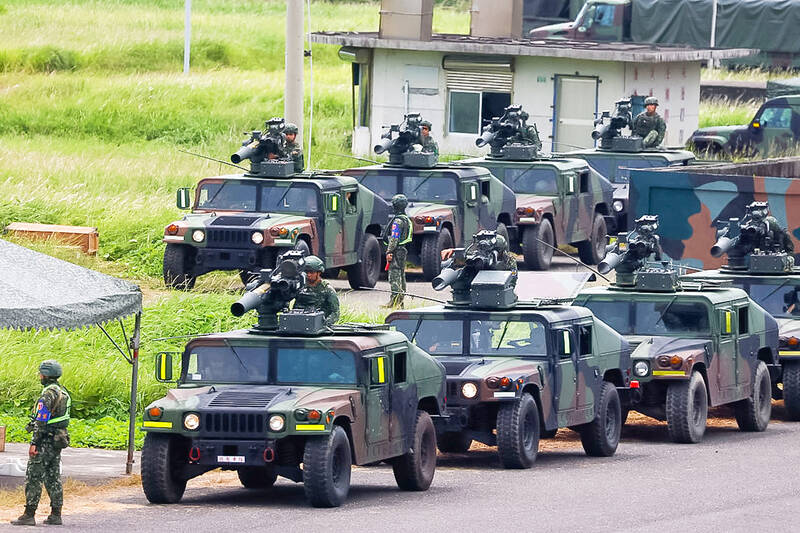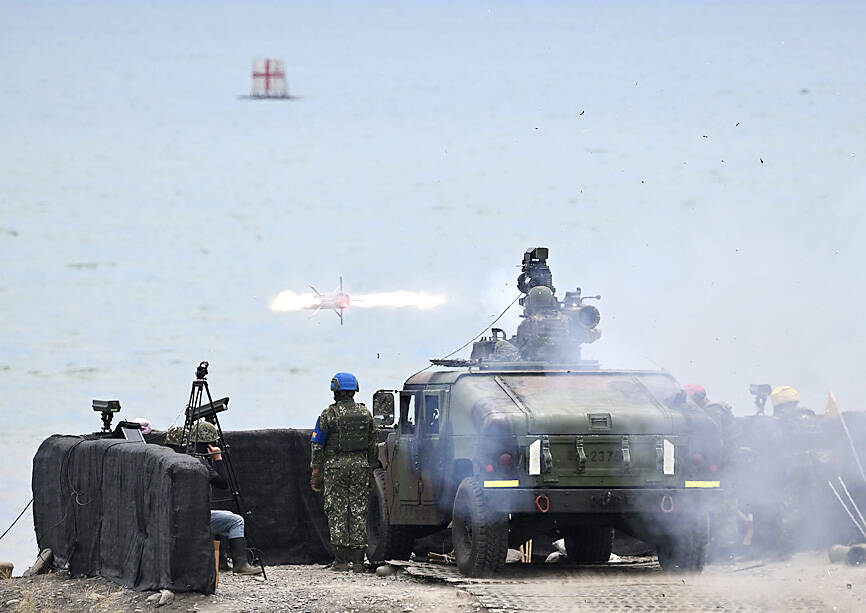The military yesterday held live-fire exercises involving precision weapons in Pingtung County to test troops’ capabilities to counter potential amphibious and sea attacks by China.
The “Sky Horse” exercises were open to the media and involved troops from the army’s 542nd, 564th, 269th and 234th brigades, Hualien Defense Command, Army Infantry Training Command and the 99th Marine Brigade.
During the drills, soldiers fired TOW 2A anti-tank missiles at targets in the sea from a coastal drill area in Fangshan Township (枋山).

Photo: Ann Wang, Reuters
Major Huang Chieh-hung (黃介宏), an instructor from the Army Infantry Training Command who was in charge of the drill, said the soldiers used sighting devices to boost the missiles’ accuracy, adding that about 70 percent of the projectiles hit their designated targets at sea.
The major difference between this year’s Sky Horse exercise and previous ones is that TOW 2B anti-tank missiles were fired from vehicles instead of from the ground, he said.
Firing missiles from a vehicle increases mobility and helps soldiers defend against enemy attacks by engaging effectively at an early stage, Huang added.

Photo: Lo Pei-de, Taipei Times
Taiwan has purchased 1,240 TOW 2B anti-tank missiles, 24 Humvee armored vehicles upon which the missiles would be mounted and 30 targeting systems from the US, the Ministry of National Defense has said.
The weapons are to be delivered by 2025, the ministry said.
The military also held a live-fire exercise involving helicopters and Thunderbolt-2000 rocket systems at a separate drill ground in Pingtung.
Today, the armed forces are to hold live-fire exercises that would involve Avenger air-defense systems and Stinger surface-to-air missiles.
The drills come against the backdrop of aerial and naval maneuvers by China in and around the Taiwan Strait.
Last month, eight Chinese warplanes approached Taiwan’s contiguous zone — or the band of sea within 24 nautical miles (44km) of its coast.
In May, China’s Shandong aircraft carrier group sailed through the Taiwan Strait in a rare voyage.
Additional reporting by AFP

POSITIVE DEVELOPMENT: Japan and the US are expected to hold in-depth discussions on Taiwan-related issues during the meeting next month, Japanese sources said The holding of a Japan-US leaders’ meeting ahead of US President Donald Trump’s visit to China is positive news for Taiwan, former Japan-Taiwan Exchange Association representative Hiroyasu Izumi said yesterday. After the Liberal Democratic Party’s landslide victory in Japan’s House of Representatives election, Japanese Prime Minister Sanae Takaichi is scheduled to visit the US next month, where she is to meet with Trump ahead of the US president’s planned visit to China from March 31 to April 2 for a meeting with Chinese President Xi Jinping (習近平). Japan and the US are expected to hold in-depth discussions on Taiwan-related issues during the

‘LIKE-MINDED PARTNER’: Tako van Popta said it would be inappropriate to delay signing the deal with Taiwan because of China, adding he would promote the issue Canadian senators have stressed Taiwan’s importance for international trade and expressed enthusiasm for ensuring the Taiwan-Canada trade cooperation framework agreement is implemented this year. Representative to Canada Harry Tseng (曾厚仁) in an interview with the Central News Agency (CNA) said he was increasingly uneasy about Ottawa’s delays in signing the agreement, especially as Ottawa has warmed toward Beijing. There are “no negotiations left. Not only [is it] initialed, we have three versions of the text ready: English, French and Mandarin,” Tseng said. “That tells you how close we are to the final signature.” Tseng said that he hoped Canadian Prime Minister Mark Carney

President William Lai (賴清德) yesterday bestowed one of Taiwan’s highest honors on Saint Vincent and the Grenadines (SVG) Ambassador Andrea Clare Bowman in recognition of her contributions to bilateral ties. “By conferring the Order of Brilliant Star with Grand Cordon on Ambassador Bowman today, I want to sincerely thank her, on behalf of the Taiwanese people, for her outstanding contribution to deepening diplomatic ties between Taiwan and SVG,” Lai said at a ceremony held at the Presidential Office in Taipei. He noted that Bowman became SVG’s first ambassador to Taiwan in 2019 and

A man walks past elementary school artworks at the Taipei Lantern Festival in Ximen District yesterday, the first day of the event. The festival is to run from 5pm to 10pm through March 15.